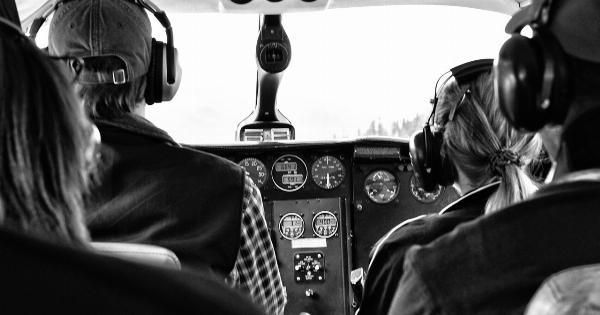Traveling by air has become increasingly popular and accessible in recent years. Whether you are flying for business or pleasure, it’s important to understand how your body reacts to the unique conditions of air travel.
From changes in air pressure to decreased humidity levels, flying can have various effects on your body. In this article, we will explore the physiological and psychological responses that occur when you are up in the air.
1. Changes in Air Pressure
One of the most significant factors that affects your body during a flight is the changes in air pressure. As the airplane ascends, the air pressure in the cabin decreases.
This can lead to discomfort and pain in your ears, especially during takeoff and landing. To equalize the pressure, it’s essential to swallow, yawn, or chew gum.
2. Dehydration and Dryness
Another effect of flying is the low humidity levels in the aircraft cabin. The humidity can drop to as low as 10-20%, which is significantly lower than the average humidity on the ground.
This dry environment can cause dehydration and dryness in the eyes, skin, and nasal passages. It is important to drink plenty of fluids during the flight and use moisturizers to prevent discomfort.
3. Ear Blockages and Pain
Ear blockages and pain are common during air travel due to changes in air pressure. The Eustachian tubes in your ears help equalize the pressure between your middle ear and the atmosphere.
When these tubes are blocked, you may experience a feeling of fullness, muffled hearing, or even sharp pain. Chewing, yawning, or using earplugs can help alleviate these symptoms.
4. Motion Sickness
For some individuals, flying can trigger motion sickness, also known as airsickness. This condition occurs when there is a conflict between the visual and vestibular (balance) systems.
The sensory disorientation can lead to symptoms such as nausea, dizziness, and vomiting. Looking out of the window, focusing on a fixed point, or using motion sickness medications can help manage these symptoms.
5. Fatigue and Jet Lag
Long flights, especially those crossing multiple time zones, can disrupt your body’s natural circadian rhythm, leading to jet lag. The sudden change in time can result in fatigue, sleep disturbances, difficulty concentrating, and general malaise.
It’s advisable to adjust your sleep schedule in advance, stay hydrated, and expose yourself to natural light to minimize the effects of jet lag.
6. Reduced Oxygen Levels
At cruising altitude, the oxygen levels in the aircraft cabin are lower than what you experience on the ground.
While this reduction in oxygen is generally well-tolerated by healthy individuals, it can pose challenges for those with respiratory conditions or cardiovascular issues. If you have a pre-existing medical condition, it’s crucial to consult your healthcare provider before flying.
7. Swelling and DVT
Extended periods of sitting can lead to swelling in the lower limbs and increase the risk of deep vein thrombosis (DVT). DVT occurs when a blood clot forms in a deep vein, often in the legs.
To minimize the risk, it’s recommended to move around the cabin, perform simple exercises, wear compression stockings, and stay hydrated during the flight.
8. Anxiety and Stress
For many individuals, flying can be a source of anxiety and stress. The combination of unfamiliar surroundings, turbulence, and the feeling of being out of control can trigger anxiety symptoms.
It’s essential to practice relaxation techniques, deep breathing, and distract yourself with entertainment options to manage anxiety and make your flight more enjoyable.
9. Impaired Digestion
The combination of altitude, changes in air pressure, and dietary factors can affect your digestion during a flight. Some people may experience bloating, gas, or an upset stomach.
To minimize these symptoms, it’s recommended to eat light meals, avoid foods that are known to cause discomfort, and stay hydrated throughout the flight.
10. Impact on Skin
Flying can also have an impact on your skin. The low humidity levels and recycled air in the cabin can lead to dry skin, irritation, and exacerbation of certain skin conditions, such as eczema.
It’s important to moisturize your skin before and during the flight, avoid excessive alcohol consumption, and use a hydrating facial mist to keep your skin refreshed.
Conclusion
Flying can have several effects on your body, both physiological and psychological.
From changes in air pressure and low humidity to ear blockages and motion sickness, it’s important to be aware of these potential reactions and take appropriate measures to mitigate them. By understanding how your body reacts to flying, you can enhance your comfort and overall experience while traveling by air.






























